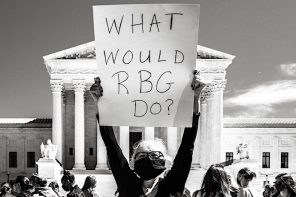In the 1880s, seeking to project complete political neutrality, the Mormon Church purposely split itself between the Democratic and the Republican parties. At the time, explained Lynn Wardle, a professor at the Brigham Young University’s J. Reuben Clark Law School, Utah was fighting for statehood. Both Democrats and Republicans were wary, not just because of polygamy, but because they each feared that the church’s members would throw their support to the other side. “The church realized it was in a no-win situation,” he said. “It sent apostles to various communities and said we want you to divide.” Wardle says that a friend of his, a judge who grew up in a small Utah mountain town, heard people describe the day “when the apostle came to town and said everyone who lives on this side of the street becomes Republicans, and people on that side of the street should register as Democrats.”
Since then the LDS church, despite its deep social conservatism, has largely remained scrupulously nonpartisan. Every election year, the church sends out letters to be read at temples urging people to vote, but never telling them who to vote for. Wardle knew one Utah Stake President—the Mormon equivalent of a bishop in a Catholic diocese—who felt uncomfortable reading even such a neutral exhortation: “He said personally I don’t even vote, because politics are so dirty.”
In light of this history, the critical role that Mormons played in organizing to pass Proposition 8, California’s anti-gay marriage amendment, represents a profound shift. On June 29, 2008, a letter from church leadership was read at every Mormon congregation in California saying, “We ask that you do all you can to support the proposed constitutional amendment by donating of your means and time to assure that marriage in California is legally defined as being between a man and a woman.” Mormons responded avidly, reportedly raising more than half the money to fund the Proposition 8 campaign and playing an indispensable role in the initiative’s ground operation.
The last time Mormons were so involved in such a high profile, controversial campaign in the United States was the fight against the Equal Rights Amendment in the 1970s. For those who work in the international realm, though, Mormon activism is nothing new. The last decade has seen a flurry of conservative interfaith organizing at the global level, largely in response to feminist gains, and Mormons have been key leaders of the emerging international religious right. Some of the lessons right-wing Mormon activists learned globally have likely contributed to their newfound success in influencing American politics.
Because it operates at the esoteric level of United Nations bureaucracy and international law and policymaking, the global religious right isn’t nearly as visible as the domestic version. To understand it, it’s necessary to understand the way that women’s rights—and reproductive rights specifically—are increasingly being treated as human rights under international law. Women who have been denied medically necessary abortions have won rulings against their own countries in international forums like the United Nations Human Rights Committee and the European Court of Human Rights. International treaties like the Convention of the Elimination of Discrimination Against Women, or CEDAW, call on signatory countries to foster equality, and various UN committees monitor member nations’ progress towards eliminating sexism in both national laws and cultural practices.
These tensions command scant public attention, especially in the United States, where international law carries little weight and where CEDAW has never been ratified. Abroad, however, things are different, and women’s rights activists, especially in developing countries, have appealed to the global system when seeking redress on discriminatory inheritance laws, draconian abortion bans, and protection from domestic violence, among other things. This, in turn, has led to a conservative counter-movement, with Mormons playing a leading role in a world-spanning alliance of right-wing Christians and Muslims who have banded together to defeat threats to patriarchal tradition.
Interreligious Coalition of Co-Belligerency
One of the first American conservatives to pay close attention to the way global politics was reshaping gender norms was a Brigham Young law professor named Richard Wilkins. In 1996, Wilkins, who had long fought against abortion rights domestically, attended the UN Conference on Habitats in Istanbul. As Jennifer S. Butler reports in her book, Born Again: The Christian Right Globalized, Wilkins gave a speech based on LDS president Gordon B. Hinckley’s statement, The Family: A Proclamation to the World. “By divine design, fathers are to preside over their families in love and righteousness and are responsible to provide the necessities of life and protection for their families. Mothers are primarily responsible for the nurture of their children,” Hinckley’s proclamation said, warning that “the disintegration of the family will bring upon individuals, communities, and nations the calamities foretold by ancient and modern prophets.”
Evidently, wrote Butler, Wilkins’ speech made an impact, “because two days later, Arab delegates at the conference issued a statement saying they would not sign the Habitat Agenda if it failed to recognize religion and family as the basic unit of society.” Immediately grasping their common interests, Wilkins set about organizing an international coalition of religious conservatives. He founded the World Family Policy Center at Brigham Young University, which for several years put together conferences bringing together “pro-family” delegates from throughout the world.
“Richard Wilkins feels very strongly that when the Equal Rights Amendment failed in the United States, a lot of its advocates didn’t go away, they just went to the United Nations,” said Scott Loveless, Executive Director of the World Family Policy Center. “It appeared to be a pretty concerted effort to shape customary international law into, essentially, the Equal Rights Amendment.”
Soon, Wilkins began working with conservative activist Allan Carlson to stage a series of large global gatherings under the banner of “The World Congress of Families,” and as producers of the recently released documentary Demographic Winter: The Decline of the Human Family. Held in cities throughout the world, they brought together hundreds of social traditionalists who agreed to put aside religious disagreements in the name of co-belligerency. Delegates represented the Vatican and Iran, Pakistan, Eastern Europe, Latin America—and, of course, the American religious right. Mormons were far more visible at these gatherings than they typically are at Christian conservative conferences in the United States.
In 2004, Wilkins collaborated with the government of Qatar on a conference called the Doha International Conference for the Family, which brought together representatives of American groups, like the Family Research Council, with Muslim speakers like Mahathir Mohamad, former prime minister of Malaysia, and Sheikh Yusuf al-Qaradawi, dean of the College of Shariah and Islamic Studies in Qatar. (Earlier, Qaradawi had caused an uproar during a visit to England because of his support for wife-beating and the execution of sodomites.) The Bush administration sent Wade Horn, then the assistant secretary for children and families in the Department of Health and Human Services. Wilkins has since moved to Qatar to build a pan-fundamentalist right-wing think tank, the Doha International Institute for Family Studies and Development.
Wardle, who is close to both Wilkins and Carlson and who has spoken at World Congress of Families events, suggests that members of the LDS church may have been more comfortable taking an active role in this global movement because of its low public profile. “The church’s involvement there didn’t create the same kind of a backlash that it does in California. It occurs in venues where the church’s involvement would not be provocative,” he said. Bruce C. Hafen, the president of the LDS’ European Central Area, spoke at the 2007 World Congress of Families in Poland along with a host of Catholic and Orthodox clergy and politicians. “In Central and Eastern Europe, those messages just are not going to spark an angry backlash,” said Wardle. “Those messages resonate with the overwhelming sentiment of people.”
This international work has given the church important experience that can be transferred to the domestic realm. To be sure, the LDS church didn’t need an international movement to spur its opposition to gay marriage, but working globally helped demonstrate some of the possibilities for interfaith cooperation. “In my own experience, the international efforts that I’ve been involved with showed me just how organized the other side can be, and how we really need to organize and recognize our common ground rather than focus on differences with other religions, because the liberal elements really are very well-organized,” said Loveless.
At a time when much of the rest of the Christian right is in disarray—Focus on the Family just laid off over 200 people, a fifth of its workforce—it seems possible that the LDS church could play an increasing role in public affairs. Just as evangelicals cast off their previous aversion to politics in the 1970s and 1980s, Mormons are doing so today. “We’re seeing what I think is a tectonic shift in Mormon attitudes about getting involved in politics,” said Wardle. Serious theological differences may continue to hinder close collaboration between Mormons and the other sectors of the religious right. But as Catholics and Protestants showed in the 1980s and 1990s, and as Mormons, Muslims, and others are demonstrating globally, nothing helps heal sectarian tensions like a common enemy.



